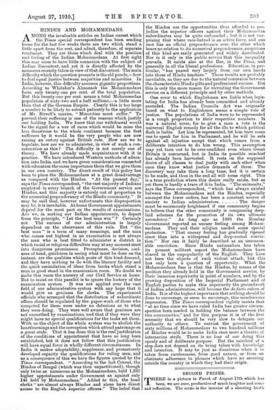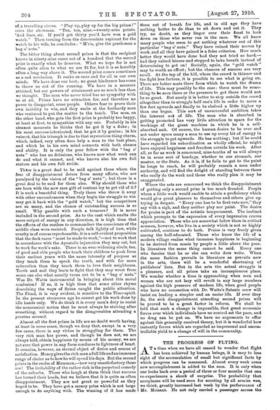SECOND PRIZES.
THERE is a picture in Punch of August 17th which has been, we are sure, productive of much laughter and some sad reflection. The scene is the interior of a shooting booth of a travelling circus. " Play up, play up for the big prizes !" cries the showman. "Ten, ten, nine,—twenty-nine points. 'Ard lines, sir. If you'd got thirty you'd have won a gold watch." Then turning from the disconsolate aspirant for the watch to his wife, he concludes : " M'ria, give the gentleman a bag o' nuts."
The bitter thing about second prizes is that the recipient knows in ninety-nine cases out of a hundred that the second prize is exactly what he deserves. What we hope for is not often quite alien to what we are fit for, but it is so horribly often a long way above it. The second prize comes sometimes as a sad revelation. It ranks us once and for all in our own minds. We have done our best; no great hindrance has come to throw us out of the running. We have in a measure attained, but our powers of attainment are so much less than we thought. The man who never tried has no sympathy with us at all. Prizes have no attraction for, and therefore no power to disappoint, some people. Others fear to prove their own inability to win, and they smile at the foolhardy man who ventured to put the matter to the touch. The man, on the other hand, who gets the first prize is probably too happy, at least at first, to sympathise with any one. Probably in his clearest moments he thinks that he got it by a fluke ; in his most success-intoxicated, that he got it by genius ; in his vainest, that his triumph is due to that mysterious thing charm, which, indeed, very often does help a man to the best place, and which he in his own mind connects with both chance and ability. It is only the poor fellow with the "bag o' nuts" who has no delusions, who knows now what work can do and what it cannot, and who knows also his own full stature and his own full stride.
Th bre is a great deal to be said against those whom the fear of disappointment deters from many efforts, who are
paralysed by the vision of the "bag o' nuts "; but there is a
great deal to be said for them also. Why should those who are born with the now rare gift of content try to get rid of it ?
It is such a beautiful thing. Truly those who throw it away with other encumbrances when they begin the struggle to win may get it back with the "gold watch," but the competitors
are so many, and the chance of outstanding success is so small. Why gamble with such a treasure? It is never included in the second prize. As to the cant which exalts the
mere output of energy in any direction, it is high time that the efforts of the restless to commandeer the conscience of the middle class were resisted. People talk lightly of how, while cruelty is of course reprehensible, it is a self-evident proposition that the dark races "must be made to work,"—not to work that in accordance with the Apostolic injunction they may eat, but to work for work's sake. There is an ever-widening circle, too, of good and able people who teach their children to push from their earliest years with the same intensity of purpose as
they teach them to speak the truth, and with far more reiteration than they teach them to love their neighbours. Tooth and nail they learn to fight that they may wrest from some one else what usually turns out to be a "bag o' nuts." Was Dr. Watts instrumental in bringing about this moral confusion? If so, it is high time that some other rhyme describing the ways of Satan caught the public attention. The Fiend, it is very evident, is sensitive to the Time-spirit. In the present strenuous age he cannot get his work done by idle bands only. We do think it is every man's duty to resist the nonsensical notion that be must always be striving after something, without regard to the disagreeables attending a proxime accessit.
Almost all the first prizes in life are no doubt worth having, at least in some sense, though we deny that, except in a very few cases, there is any virtue in straggling for them. The very rich man has power, and though he does not, we are always told, obtain happiness by means of his money, we are not sure that power in any form conduces to lightness of heart. It remains, however, an eternal object of desire and source of satisfaction. Money gives the rich man a full life and an immense range of choice as to how he will spend his days. But the second prizes in the realm of Mammon,—how very unsatisfactory these are ! The irritability of the rather rich is the perpetual comedy of the suburbs. Those who laugh at them think that success has turned their heads, but we believe that it is quite as often disappointment. They are not great or powerful as they hoped to be. They have got a money prize which is not large enough to do anything with. The winning of it has made
them out of breath for life, and in old age they have nothing better to do than to sit down and eat it. They
try, no doubt, as they linger over their feast to look
down on those who never ran in the race. We all know many people who seem to get nothing whatever out of this partjcular "bag o' nuts." They have ruined their nerves by work, and all they have gained is a false criterion. How much better they would have done had they not tried so hard,---. had they valued leisure and stopped to take breath instead of determining to get on! Socially, again, the "gold watch" may be worth an effort; but the chances of success are very
small. At the top of the hill, where the crowd is thinner and the fight less furious, it is possible to see what is going on. There are better seats there from which to watch the drama of life. This may possibly be the case: there must be some- thing to be seen there or the pressure to get there would not be so great. But surely it is better to stop outside the crowd altogether than to struggle half one's life in order to move a few feet upwards and finally to be shelved a little higher up than one began. This sort of unsuccessful ambition takes the interest out of life. The man who is absorbed in getting promoted has very little attention to spare for the workings of the great machine in which he is a self- absorbed unit. Of coarse, the human desire to be over and not under spurs many a man to use up every bit of energy in the struggle to get upwards. He has nothing; but if he could have regarded his subordination as wholly official, he might have enjoyed happiness and freedom outside his work. After all, so far as work is concerned, nine-tenths of us will always be in some sort of bondage, whether to our stomach, our master, or the State. As it is, if he fails to get to the point he longs to reach, he will probably remain a man under authority, and will find the delight of standing between those who really do the work and those who really plan it may be exaggerated.
Where the arts are concerned we think the disappointment of getting only a second prize is too much dreaded. People whom a little work would enable to attain a proficiency which would give great pleasure to themselves and others give up trying in despair. "Every one has to be first-rate now," they say with a sigh, and they neither play nor paint. The desire for praise is part of the artistic temperament. The instinct which prompts to the expression of every impression craves appreciation. Those who are somewhat below them in critical acumen, however, who live in a society which is not so highly cultivated, continue to do both. Praise is very freely given among the half-educated. Those who know the life of a modern village realise what immense happiness is beginning to be derived from music by people a little above the poor. In literature the same thing cannot be said. Every one who fancies that he or she can write does write. When the same fashion prevails in literature as prevails now in the arts, there will be a wonderful shortening of publishers' lists. But in the arts the actual struggle is a pleasure, and all prizes take an inconspicuous place. We wonder whether a time is approaching when men and women who are not lazy will revolt in any large numbers against the high pressure of modern life, when good people who have no connection with Dr. Watts's Satanic crew will insist on leading a simpler and an easier life. If ever they do, the sick disappointment attending second prizes will be proved to be a great factor in reform. We shall be told that such a change is impossible, that great economic forces over which individuals have no control set the pace, and no drag can be put on. We have no arguments to offer against this generally received theory, but it is wonderful how instantly forces which are regarded as impersonal and uncon- trollable yield to a change of will in the community.







































 Previous page
Previous page